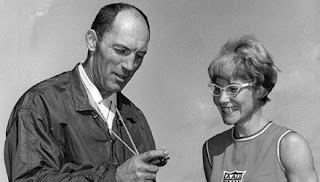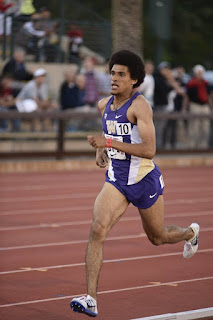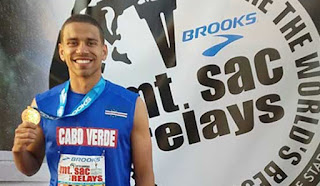Ken Foreman is finally inducted into the USA Track & Field Hall of Fame...
 Courtesy of Seattle Pacific University, here's a great read on the career of the newest USA Track & Field Hall of Famer, the long time track & cross country coach of the Falcons, Dr. Ken Foreman.
Courtesy of Seattle Pacific University, here's a great read on the career of the newest USA Track & Field Hall of Famer, the long time track & cross country coach of the Falcons, Dr. Ken Foreman.As he sat in a Fremont coffee shop talking about his career, Ken Foreman (left, with Doris Heritage/photo courtesy Seattle Pacific University) was still very much in a coaching mode.
No surprise there. He has been coaching since age 25. And he’s not ready to stop at age 87.
“If I walked out that door right now, and somebody needed instruction, I would be willing and happy to do it,” Foreman said.
Matter of fact, the legendary Seattle Pacific track and field coach, who at different times also served the school as a basketball coach, cross country coach and athletic director, is still teaching the finer points of his trade to the track and cross country teams at Konawaena High School in Kailua Kona on the Big Island of Hawaii.
Come Saturday night in Indianapolis, Foreman will reap one of the ultimate rewards for his 62 years of time and coaching talent when he is inducted into the USA Track & Field Hall of Fame.
“How this happened, I do not know. But I’m shocked and humbled,” Foreman said. “The call came to my wife (Denise), and she passed the phone to me. Somebody started talking about the Hall of Fame, and I thought they were saying I had been recommended. But they said, ‘No – you’re in the Hall of Fame.’
“I was speechless.”
Foreman might have been stunned at his selection, but many of his former athletes certainly aren’t.
Truth be told, some are wondering what took so long.
“I was embarrassed to be in any Hall of Fame before he was,” said former distance running star and longtime coach Doris Heritage. “He didn’t always have everything easy, and I think that’s the case with a lot of good coaches. He has practiced what he preaches about accepting challenges and opportunities, and stretching yourself to levels you haven’t been, using your God-given capabilities and the gifts you’ve been given.”
Added Lynette Matthews, who developed into a world-caliber discus and shot put star under Foreman’s guidance, “He gave and gave of himself in so many ways to see us be and do our best. He was a coach, but he is a friend. He’s more than an athletic coach. He’s a life coach whose life spoke loudest.”
VERSATILITY ONE OF HIS HALLMARKS
The man who became synonymous with track and field as a coach, whether at Seattle Pacific or with the U.S. national team, was a college All-American athlete in his day … as a gymnast. And was an interscholastic world record holder … in the rope climb. And won high school all-city recognition in Los Angeles … as a second baseman.
I loved everything in season,” Foreman said. “I loved being a baseball player, but that option didn’t present itself (after high school). So I went for gymnastics and track and field.”
Even when he came to what then was Seattle Pacific College in 1949, Foreman’s duty was that of JV basketball coach. He did that for three years, then moved up to head basketball coach and athletic director.
But, “My real love was for the growing track and field program,” Foreman said. “We had some good kids early on.
“The rest is history.”
During his three tenures at the track helm – 1950-57, 1965-78, and 1985-2000 – Foreman’s athletes made plenty of history. The man regarded as the patriarch of Falcon athletics and the builder of Royal Brougham Pavilion and of the Foreman Track/Wallace Field facility had 13 of his women’s teams finish among the top 10 in the country. Altogether, his athletes recorded 26 individual national titles and 159 All-American performances.
“He honored and treated us as women on and off the field,” Matthews said. “Somehow, he drew our motivation out from deep within rather than by dangling carrots in front of us.”
It wasn’t actually on the track where Foreman decided he wanted to be a coach. It was in the middle of the South Pacific during World War II, where he served in the Coast Guard.
“One night, I was standing watch between Guam and Okinawa, and I said to myself, ‘If I make it home from the war, I’m going to try to go to school and be a coach,’ Foreman recalled. His reasoning?
“I would not be where I am if not for high school coaches. They were huge in my life.”
What gave Foreman an edge? One thing was his extensive knowledge of exercise physiology. In fact, he says, for any coach who wants to be successful today, “You either have to know physiology, anatomy or biomechanics. You have to be a quasi scientist. That would not have been possible when I started coaching in 1947.”
Said Heritage, “When he first started coaching, there were not very many people in the field who had the knowledge to be a good coach. He has a physiological background, and there were few people with that kind of background who worked with athletes – particularly people who worked with women.”
Another facet of his success was keeping it all in perspective.
“I think anyone who knows me would say, “Ken Foreman was always more interested in me as a person and as an athlete rather than as someone who could get points for the team or for him,’” he said. “I could care less how many points the team scores. I want each athlete to do her or his best.”
Heritage agreed.
“What he gave to people is he helped them believe in themselves and in being a well-rounded human being,” she said. “He treats everyone like they’re capable of being an Olympic athlete. As a result, these people rise and believe in themselves, and it makes them a different person.”
Now retired in Hawaii with wife Denise, Foreman returns to Seattle a few times a year for medical appointments. His blood still runs a very deep shade of SPU maroon.
“None of this could have happened anyplace other than Seattle Pacific,” he said. “President (C. Hoyt) Watson gave me the opportunity to explore the world, unfettered, as long as what I did was beneficial to the school. It’s the school and the kids with whom I was privileged to work who have lifted me to whatever I have achieved.”
Foreman recalled a comment from legendary Tennessee State coach Eddie Temple as a simple way to sum up his own success at Seattle Pacific.
“He said, ‘I loved them a little, I learned them a little, and they performed.”
NOTE: To read the full story, please click here...


Comments